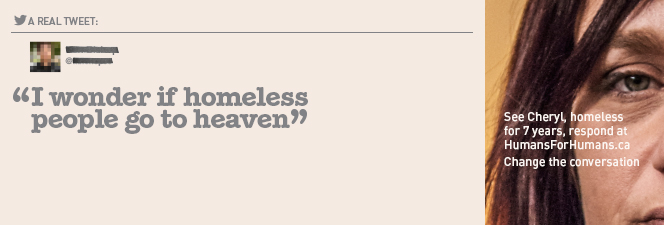
At Raising the Roof, we feel strongly that homelessness does not define an individual. Before anything else, that person is a human being. A human with dreams. Skills. Compassion.
While this is our stance, it’s undeniable that stereotypes about homelessness exist. These myths and misconceptions about the homeless are perpetrated in many ways, including everything from daily interactions to government policies. Sadly, these myths are some of the leading voices in the public conversation on homelessness.
So what are some of the myths and misconceptions surrounding homelessness?
Homelessness is a choice.
The unfortunate belief that homelessness is somehow a choice made by people faced with this situation is all too untrue. For many, homelessness is the only option once evicted, kicked-out, or when affordable housing is not an immediate opportunity. Trauma can also play a large role. When coping with mental illness or addiction, maintaining independent housing may not be feasible.
All people experiencing homelessness are lazy.
People experiencing homelessness are anything but lazy. Survival when homeless requires actively seeking shelter, food and other necessities, which are, more often than not, not adequately or consistently provided by the support services available. Actively seeking employment is also a laborious task, especially with inconsistent access to a phone or computer.
This perception of laziness may be derived from moments when the homeless have been observed sleeping outside. However, what is not understood is the conditions of some shelters where getting a ‘good night’s sleep’ is not a possibility. The majority of people experiencing homelessness who make use of the shelter system suffer from sleep deprivation, which often leads to further medical complications.
People experiencing homelessness are all addicts.
The stereotype of homelessness being connected to alcoholism and drug addiction is unfortunately one of the most common misconceptions. While a percentage of the homeless population does struggle with substance abuse, there are many who do not. These individuals may be suffering from mental illness, trauma, or any number of issues that have resulted in their becoming homeless.
Why don’t they get a job?
While employment seems like a simple solution to homelessness, it is a complex issue. Applying for work can be difficult without a permanent address or regular access to a shower or transportation. Other obstacles such as mental illness can also be a barrier to seeking employment.
Some individuals experiencing homelessness are employed, albeit precariously. Part-time or minimum wage employment often fails to meet the income needs of an individual or family, particularly in more expensive housing markets.
Ample services and supports exist to help the homeless.
Until recently, support for people experiencing homelessness has been focused on providing ‘Emergency Services’ such as shelters, food banks, etc. The issue with these services is that they offer little assistance for individuals trying to escape the cycle of poverty and homelessness. Larger social factors such as lack of affordable housing and criminalization of behaviours associated with homelessness (ie. Ontario’s Safe Streets Act) contribute to the immense challenges faced by the homeless.
What we’re doing to change the conversation.
In collaboration with pro bono partner Leo Burnett Toronto, Raising the Roof recently released the Humans for Humans campaign. This ground-breaking project incorporated the authentic stories of individuals with lived experience of homelessness. In featuring participants who shared their experience, the campaign sought to provide insight into the humanity behind homelessness.
Participants were presented with statements and questions from the public, which were collected via surveys and social media (‘mean tweets’). These statements spoke to some of the common myths and misconceptions about homelessness. After reading a statement, participants shared their reactions about the contrast between the misconception and their own personal experiences. Some of the video clips and print materials are quite shocking, and emotional. But we are confident this will inspire viewers to really re-think the issue of homelessness and contribute to a more informed social awareness.
This public education campaign was released on March 16 across multiple channels nationwide. Learn more and help us change the conversation at www.HumansforHumans.ca
To learn more about Raising the Roof, please visit their charity profile page >>>

Leave a Reply